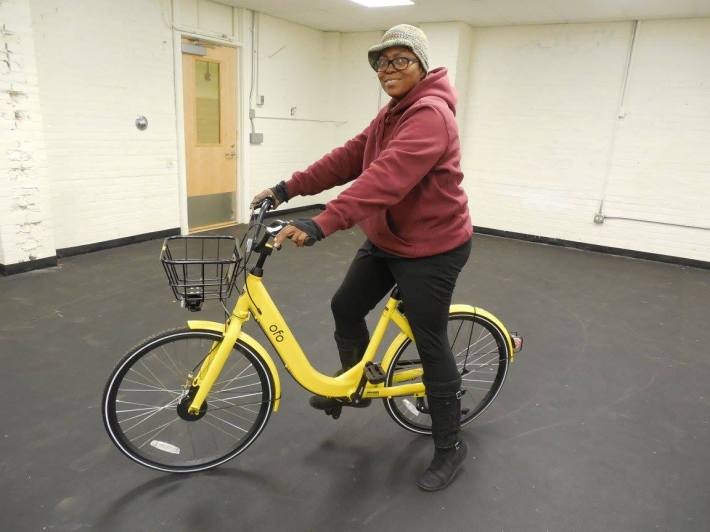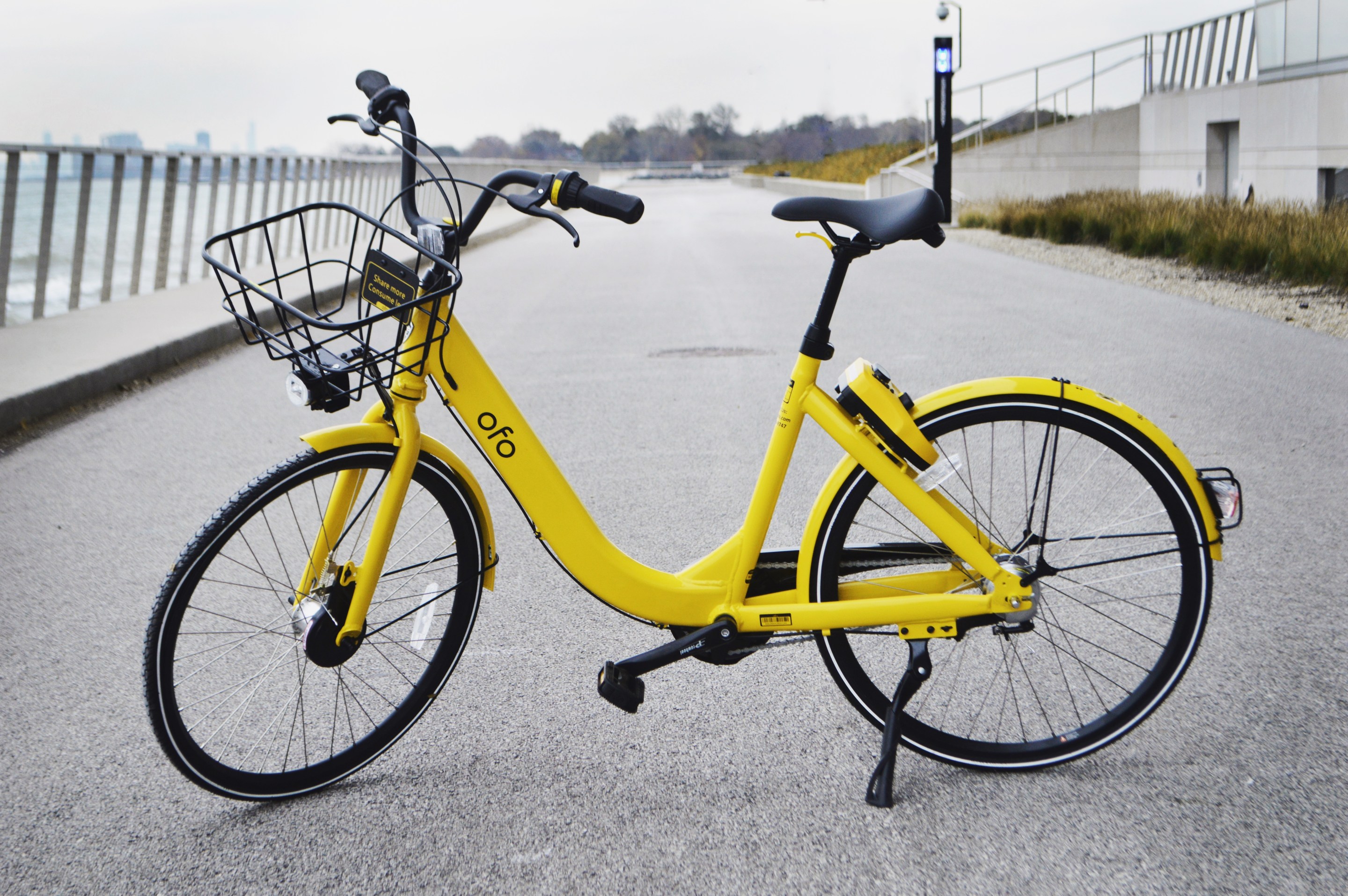Update 11/14/17, 2:00 PM: On Friday the dockless bike-share company Ofo contacted Streetsblog Chicago to tell us they planned to launch a fleet of bikes on the Northwestern University campus this week. Following an interview with the company's president yesterday, in which he detailed the plan, we published a post based on the info he provided. This morning we heard from a Northwestern spokesperson who said the university has not reached a final agreement with Ofo, and the service won't be launching this week. Ofo has since confirmed that their previous statements were premature, adding that they still hope to launch a fleet on the campus this fall. The post has been edited accordingly.
Chicago officials continue to soul-search over whether to allow dockless bike-share providers to set up shop here. Meanwhile, this week Ofo, which claims to be the world's first and largest dockless company, contacted Streetsblog Chicago about their proposal to release 50 bikes on the Northwestern University campus in Evanston, just north of the city. They also dropped off 14 cycles last weekend to kickstart a "bike library" in the Riverdale community area on Chicago's South Side, with another 100-300 vehicles scheduled to arrive there in April.
Unlike traditional systems like the Divvy network, dockless bike-share does away with the expensive stations, allowing customers to locate and unlock cycles using smart phones, and park them right at their destination. Ofo currently has over ten million bikes, serving 18 countries and 185 cities, according to U.S. vice president Chris Taylor, who grew up on Chicago's Southwest Side and graduated from Northwestern. “So we’re the first, we’re the largest, and really the people that started the whole dockless bike-sharing thing."
The Beijing-based company current has over 2,000 bikes in Seattle, more than 1,000 in Dallas, and 400 in Washington, D.C., as well as cycles in some parts of Denver, L.A., Boston, and Miami. They plan to launch in the next couple of weeks in Phoenix, plus Charlotte and Durham, North Carolina.
Taylor says Ofo is currently in negotiations with Northwestern to launch the pilot program later this fall. The initiative would offer free use of the bikes through the university's finals in December. In other cities, the cycles cost $1 per hour to ride, compared to $9.95 for a Divvy day pass, which allows for an unlimited number of 30-minute trips. Ofo hopes to expand the Northwestern fleet in the spring, at which time the usual user fee would kick in.
According to Ofo's proposal, customers would be allowed to ride the Northwestern bikes on or off the campus, and to lock them at off-campus destinations, such as their apartments. However, Ofo would use geo-fencing technology so that it would only be possible to unlock a cycle on the campus. Bikes that are left locked up off campus would be retrieved by rebalancing staffers, Taylor says.
Taylor adds that his company has had "very preliminary" contact with Chicago officials about releasing bikes here. "Our goal is to talk with the city of Chicago some time in January, and to be able to provide service before the snow melts," he says.
City officials have previously voiced concerns that dockless bikes won't be well maintained, that fallen cycles will create tripping hazards, and that they might be concentrated in high-demand parts of town that already have Divvy stations, instead of helping to expand the bike-share zone to underserved communities. I asked Taylor about these issues.
“Our focus is on operational excellence,” he says, adding that Ofo typically hires many people within in a city to make sure bikes are promptly fixed if they break down. "Unfortunately vandalism does happen, and broken bikes do happen. The key for us is to make sure it’s not an eyesore for the community." He notes that the company has technology that alerts staffers when a bike hasn’t been moved in a certain amount of time, which might indicate a low-demand location or a maintenance issue. "We’ve raised over $1.2 billion in capital and we’ve done 2 billion rides this year," Taylor says. "A couple of our cities in China have over a million bikes. We pride ourselves on running our operations really well."
I noted that Amsterdam recently banned dockless bikes to prevent them from clogging bike racks, and that it's not hard to find photos of poorly parked bikes on the Internet, scattered across sidewalks or blocking crosswalks. "What’s most important, especially for people with disabilities, is to make sure that the right-of-way is clear," Taylor responds. "If bikes are parked in a way that you can legally park a bike, then there’s no issue."
Moreover, Taylor argues, it's important to consider the potential benefits of bringing thousands of public bikes to a city in terms of lowering congestion and pollution, and improving health and mobility, which would outweigh any inconveniences or eyesores posed by mis-parked cycles. “Our focus is to get all those positives to the people of a city and then make sure to minimize any potential negatives,” he says. "My mom still lives in Chicago. I don’t think my mom has once said there are too many bikes on the bike racks. What she has said is there are too many cars on the street and that traffic is a nightmare."
We'll have to see whether Chicago politicians and civic leaders like downtown alderman Brendan Reilly, who blocked Divvy from installing stations on the Magnificent Mile shopping district, share Taylor's point of view.

As for the question of whether dockless bike-share will be rolled out in an equitable manner, Taylor argues that the Riverdale donation reflects a focus on the public good that is in his company's DNA. "Our founder conceived of the product while he was teaching in rural western China, so that his students could have a way to get to school.” He adds that employees can take up to six-month sabbaticals to volunteer to teach, and Ofo partners with many local nonprofits and foundations to donate bikes to those need them. The company is currently planning to provide thousands of bikes to residents in Puerto Rico to help out with hurricane recovery efforts, he says.
"The reason Divvy puts their stations where they put them is because those stations cost [tens of thousands of dollars] to manufacture and they can only produce so many of them with the taxpayer dollars that they receive," Taylor says. He argues that dispensing with the docks, which he calls "obsolete technology," will make it easier to bring shared bikes to Chicago communities that don't have Divvy stations yet. "So we actually solve that redlining [issue.]"
"We’re excited about this pilot at my alma mater, Northwestern, and we’re excited about talking with the city of Chicago," Taylor concluded. "This is such an innovative city and such a smart city, so we’re excited to... figure out how we can operate in Chicago."




